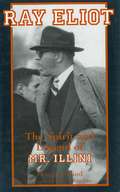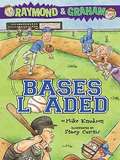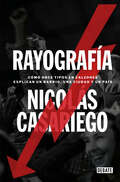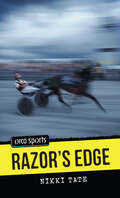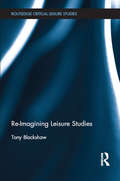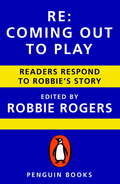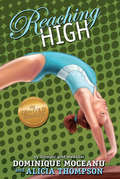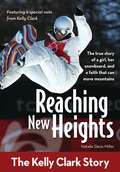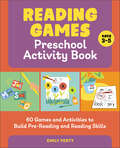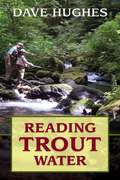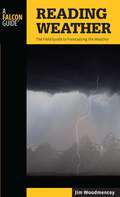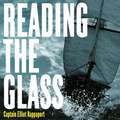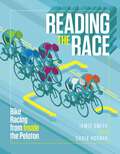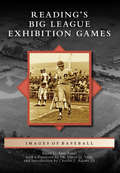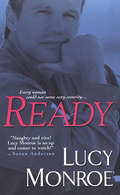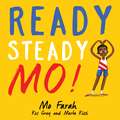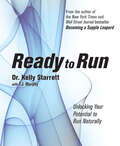- Table View
- List View
Ray Eliot: The Spirit and Legend of Mr. Illini
by Doug CartlandThis biography of legendary University of Illinois coach Ray Eliot describes a man who loved football and motivating his team. Doug Cartland, writes of his grandfather's life as one to admire, to learn from, and to be inspired by.
Ray Eye's Turkey Hunting Bible: The Tips, Tactics, and Secrets of a Professional Turkey Hunter
by Ray EyeLegendary turkey hunter Ray Eye provides all of the information you need to know to successfully hunt wild turkeys across the country: how to scout, how and when to call, special tactics for the early season, how to hunt pressured turkeys, how to hunt heavy timber or open fields, and much, much more. Told in Ray's down-home, folksy manner, the book not only informs, but entertains as well. There's also a bonus storytelling section that will have you laughing in stitches as you read of some of Ray's more ponderous exploits.
Ray Mears Outdoor Survival Handbook: A Guide to the Materials in the Wild and How To Use them for Food, Warmth, Shelter and Navigation
by Ray MearsLet Ray Mears, the grand master of bushcraft, teach you everything you need to know about how to survive outdoors. Ray's in-depth knowledge, and years of practical experience will equip you with the know-how you need to make the most of the great outdoors and experience it to the full. 'I wanted a book on basic survival and bushcraft relevant to UK and this hit the spot' -- ***** Reader review'This is a permanent resident in my rucksack and I read it over and over' -- ***** Reader review'Great book by the grand master of bushcraft' -- ***** Reader review'What can you say - it's Ray Mears and he's brilliant. Like all his stuff, very good.' -- ***** Reader review'Very clear, informative and easy to understand' -- ***** Reader review'Ruddy good read! The man knows his stuff!' -- ***** Reader review***************************************************************************************************Ray Mears' Outdoor Survival Handbook is a book of discovery, explaining the everyday skills you need to live in and enjoy the natural world.Season by season, this unique guide, with line illustrations, describes the resources and materials available in the wild and how to use them. Whether you want to spend a day, a week or a month out of doors, Ray Mears' Outdoor Survival Handbook will help you enjoy it to the full.Learn how to identify animal tracks, make a simple camp bed and shelter out of natural materials, pick edible fungi, smoke meat and fish, transport a fire and weave baskets, and many other essential skills...Packed with practical tips, insights into nature and respect for traditional knowledge, this is a book for families, groups and individual hikers and climbers - for everyone who enjoys outdoor life.
Raymond and Graham: Bases Loaded
by Steve Knudson Mike WilkinsonBest friends Raymond and Graham can't wait to defeat their rival team and win the Little League championship, impressing the girls they like and shaming their school bully in the process. But things don't go exactly as planned . . . With kid-friendly humor and funny black-and-white illustrations, this series is perfect for middle-grade readers, especially boys.
Rayografía: Cómo once tipos en calzones explican un barrio, una ciudad y un país
by Nicolás CasariegoEn vísperas del centenario del Rayo Vallecano, Casariego juega el partido de una trepidante y personal crónica de esta temporada del club obrero por excelencia.El 20 de agosto de 2022, en un Madrid azotado por una ola de calor, el escritor y guionista Nicolás Casariego se subió al metro en dirección a Vallecas con el objetivo de abonarse al Rayo Vallecano, un club a las puertas de celebrar su centenario. Ignoraba que le esperaba una noche al raso y una aventura de diez meses. Esta es la historia de un aficionado que trata de entender de qué va hoy el fútbol siguiendo los pasos del equipo de un barrio singular.A lo largo de la temporada 2022-2023, asistió a todos los partidos del Rayo en su estadio, a los que disputó como visitante contra sus vecinos madrileños y a nueve de los que jugó en otras ciudades, viajando a todas las Comunidades españolas con clubes en Primera División. Recorrió más de 4.500 kilómetros y trató con cientos de personajes. Sobre todo, se preguntó si un adulto puede cambiar su identidad y hacerse de otro equipo. Cargado de humor, este libro va más allá del fútbol. Incluye un autorretrato y reflexiones sobre aspectos tan variados como el análisis financiero de las cuentas de un club, el crecimiento urbanístico de una ciudad o la explicación científica de lo que nos ocurre en el cerebro al celebrar un gol. A medio camino entre las memorias y la crónica de una pasión, Rayografía describe desde las gradas un universocontrovertido, un negocio multimillonario y sin fronteras y un territorio dominado por la emoción. En definitiva, la vida.
Rayzor's Edge: Rob Ray's Tough Life on the Ice (Tales Ser.)
by Rob Ray Budd Bailey Matthew BarnabyRob Ray was known as one of the NHL's toughest players of the 1990s. During his thirteen seasons with the Buffalo Sabres he twice lead the league in time spent in the penalty box. Ray was known for his jersey-off fighting style, which eventually led to the "Rob Ray Rule" banning that practice. In Rayzor's Edge, Ray shares many humorous and insightful stories from his Sabres career.
Razones de la pelota
by Luis Fernando IglesiasNarrados con humor e ironía, estos cuentos nos ponen frente al espejo de lo que somos, para devolvernos una mirada piadosa y compasiva. El fútbol condensa las emociones y sentimientos de los uruguayos hasta convertirse en cifra que explica todo lo humano, una metáfora obligada para interpretar cualquier fenómeno, un rasgo identitario. En las narraciones que componen este libro, Luis Fernando Iglesias sitúa a sus criaturas en un escenario futbolero como parte de una estrategia para hablar de otras cosas: del amor, de las relaciones humanas, de la necesidad de mentirse un pasado, de la amistad en tiempos turbulentos. En definitiva, es un libro que nos habla de nosotros mismos, con nuestras grandezas y miserias.
Razor's Edge (Orca Sports)
by Nikki TateTravis and his best friends Ryan and Jasper live for the thrill of watching their horses race. When a thief starts hacking off the tails of Standardbred horses stabled at Blackdown Park, suddenly the track isn't such a great place to hang out. Things get even more unpleasant when a troubled girl comes between Travis and his friends. Travis has to make some tough choices, but how can he stand by his friends when he no longer trusts them?
Re-Imagining Leisure Studies (Routledge Critical Leisure Studies)
by Tony BlackshawIn this provocative new book, Tony Blackshaw argues that Leisure Studies is in a quiet but deep state of crisis. The twenty-first century has brought profound change to all aspects of society, including a plurality of new leisure worlds, and traditional concepts of Leisure Studies fail to capture this richness. This book aims to re-invigorate Leisure Studies by revealing and unpacking these leisure worlds, thereby changing the way we think about leisure and the way we do Leisure Studies. Both trivial and serious in its implications, it is precisely this paradox that makes leisure such a fascinating subject of study. Re-Imagining Leisure Studies presents a new and radical set of methodological rules for studying leisure trends and cultures in contemporary society. It discusses the critical issues that underpin recent developments in leisure theory and explores the key themes of social class, community, politics, freedom and globalization. Marking a turning point in the reception and understanding of Leisure Studies, this book is vital reading for all students and scholars with a social scientific interest in leisure.
Re: Readers Respond to Robbie's Story
by Robbie RogersIn his memoir, Coming Out To Play, Robbie Rogers told the story of his incredible journey from terrified teenager to a trailblazing out and proud professional soccer player for the L.A. Galaxy. Since it was published, he has received letters from countless readers from all walks of life, all across the world, telling him how he has given them hope and that after reading his story, they felt compelled to share their own. RE: Coming Out To Play is a collection of ten of these stories. They show both the acceptance and love that so many receive as they come out, but also that there are many who still struggle with the fear that they will be rejected if they reveal the truth about themselves. This is why Rogers has collected these letters: to show those suffering in silence that they are not alone.
Reaching High (The Go-for-Gold Gymnasts #3)
by Dominique Moceanu Alicia ThompsonLong-limbed, red-haired Jessie might be the quiet girl on the Texas Twisters, but she's a force to be reckoned with where it counts-on the vault and in her heart. With freshman year on the horizon, Jesse decides that it's time to stop hiding in the shadow of her teammates and do the last thing anyone expects: join the cheerleading squad. Jessie proves that her gymnastic skills make her a perfect fit for the team, and becoming friends with the team captain makes Jessie feel like people care about her, and not just her talent. But with cheer practice suddenly taking up all of her spare time, Jessie barely gets the chance to see her fellow gymnasts. Can Jessie bridge the gap between her new teammates and old friends? Or will she have to pick between being a cheerleader and being a gymnast? Olympic gold medalist Dominique Moceanu and Alicia Thompson present The Go-for-Gold Gymnasts, a fliptastic series full of heart, humor, and spirit! Follow the four girls as they navigate the world of competitive gymnastics, try to balance their passion with normal lives, and learn to believe in the power of friendship.
Reaching New Heights: The Kelly Clark Story (ZonderKidz Biography)
by Natalie Davis MillerReaching New Heights Snowboarder and Olympic Gold Medalist Kelly Clark had accomplished her life’s goals by the age of 18. Yet, success didn’t leave her feeling fulfilled. Two years later, at an event in Salt Lake City, Kelly stood at the bottom of the pipe, listening to one snowboarder console another who had just crashed: “It’s alright. God still loves you.” These words led Kelly on a new journey from an Olympian snowboarder into an awesome relationship with Jesus. This story of one of the world’s greatest snowboarders will encourage readers young and old to reach for the next level, knowing that God will be with them, win or lose.
Read About Derek Jeter
by David P. TorsielloYankees captain Derek Jeter is profiled in this beginners' biography. Large, full-page color images bring the reader to the center of the action.
Reading Games Preschool Activity Book: 60 Games and Activities to Build Pre-Reading and Reading Skills
by Emily YertyPlay and learn with hands-on reading games for kids ages 3 to 5 Preschoolers learn best when they're engaged in creativity and play—and this activity book features 60 interactive ways for kids to have a blast while learning to read! From crafts and treasure hunts to memory games and art projects, these multisensory activities help kids learn their letters, understand stories, and discover a love of reading.The 5 core reading skills—These activities are divided into sections that focus on the key reading and pre-reading skills new readers need: letter knowledge, phonological awareness, print awareness, narrative skills, and vocabulary.See learning in action—Kids will start with easy activities and work their way through more challenging ones so they can put their new skills to the test.No special tools required—Every game comes with clear instructions and uses basic items from around the house, like markers and paper cups.Activities that keep kids moving—Get the whole family involved with games like Letter Matching, Vocabulary Tag, Odd One Out, Sight Word I Spy, and more!Building preschool reading skills has never been this much fun!
Reading Trout Water
by Dave Hughes• Second edition, completely updated in full color • Covers every water type--riffles, runs, pools, flats, pocket water, bank water • Learn how to find trout by studying currents, temperatures, oxygen levels, and food sources • 140 color photos pinpoint trout locations in specific water types
Reading Weather: The Field Guide to Forecasting the Weather
by Jim WoodmenceyReading Weather provides a quick and simple way to understand how the atmosphere works, how to interpret and use weather forecasts before venturing outdoors, and also how to make your own forecast in the field by observing the changes in the weather. This fully updated and revised reference will arm you with the meteorological knowledge necessary to make good decisions on whether to proceed or retreat in the face of a storm. Also included are helpful definitions, tables, and simplified graphics of common weather features.
Reading Weather: The Field Guide to Forecasting the Weather
by Jim WoodmenceyReading Weather provides a quick and simple way to understand how the atmosphere works, how to interpret and use weather forecasts before venturing outdoors, and also how to make your own forecast in the field by observing the changes in the weather. This fully updated and revised reference will arm you with the meteorological knowledge necessary to make good decisions on whether to proceed or retreat in the face of a storm. Also included are helpful definitions, tables, and simplified graphics of common weather features.
Reading the Glass: A Sailor's Stories of Weather
by Elliot RappaportA fascinating insight into the science of weather and the strange, wild and wonderful world of life at sea.What's in a cloud? What separates a tropical storm from a winter blizzard? And what exactly is El Niño? Elliot Rappaport, a professional captain of traditional sailing ships, has spent three decades at sea, where understanding weather could be the difference between life and death. In Reading the Glass, he offers a sailor's-eye view of the moving parts of our atmosphere and unveils the larger patterns it holds: global winds, storms, air masses, jet streams, and the longer arc of our climate.Told through a series of tall ship voyages, Rappaport's narrative takes listeners from the icy seas of Greenland to the Roaring Forties, places where one can experience all four seasons in an hour. He navigates the turbulent waters of the Strait of Gibraltar, en route to storied port cities of the Mediterranean. In the vast tropical Pacific, he crosses the equator, where heat, moisture, and unsettled winds churn out powerful squalls, and drops anchor in isolated ports of call. He explores wide swathes of ocean to explain how the trade winds have carried ships westward for centuries, and how ancient Polynesian explorers pushed back the other way.Written in stunning prose, brimming with wisdom, curiosity, and humour, Reading the Glass brilliantly blends science and memoir to reveal how weather has shaped our oceans, our history, and ourselves.(P) 2023 Penguin Audio
Reading the Glass: A Sailor's Stories of Weather
by Elliot Rappaport'Brimming with knowledge and experience . . . delightful'TRISTAN GOOLEY, DAILY TELEGRAPH'A fabulous compendium of terror and disaster, expertise and courage'ADAM NICOLSON, author of The Seabird's Cry'Evokes panoramas of sea and land with confident flair'WALL STREET JOURNALWhat's in a cloud? What separates a tropical storm from a winter blizzard? And what exactly is El Niño? Elliot Rappaport, a captain of traditional sailing ships, has spent three decades at sea, where understanding weather is the difference between life and death.From the icy seas of Greenland to the turbulent waters of the Strait of Gibraltar, from the powerful squalls near the equator to the ancient Polynesian explorers who ventured eastward against trade winds, Reading the Glass combines science and memoir to reveal the remarkable story of how weather has shaped our oceans, our history and ourselves.'An extraordinary book by a modern-day Melville . . . I can't recommend this book highly enough'MARK VANHOENACKER, author of Skyfaring'A gripping account of what weather is, how it feels to be in the middle of it, and what we can expect going forward!'BILL MCKIBBEN, author of The End of Nature
Reading the Race: Bike Racing from Inside the Peloton
by Jamie SmithIn Reading the Race, race announcer Jamie Smith and veteran road captain Chris Horner team up to deliver a master class in bike racing strategies and tactics. Armed with strategies and tactics learned over thousands of races, cyclists and cycling fans will learn how to read a race--and see how to win it. Bike racing is called a rolling chess game for a reason. Sure, a high pain threshold and a killer VO2max are helpful. But if you're in it to win it, you need race smarts. Starting breaks, forming alliances, managing a lapped field, setting up a sprint--on every page, Horner and Smith reveal new secrets to faster racing and better results. Smith and Horner dissect common mistakes, guiding riders with lessons learned from decades of racing experience. Reading the Race reveals the veteran's eye view on: Assembling the best possible team Crafting strategies around the team, course, and rivals Reacting instantly to common scenarios Making deals and combines Breaks, echelons, blocking Pack protocol and etiquette Finishing in the prize money or on the podium Winning the group ride Whether you're a new racer, an aspiring pro, a team manager, or even a roadside fan, Reading the Race will elevate your cycling IQ for better racing.
Reading's Big League Exhibition Games (Images of Baseball)
by Charles J. Adams III Brian C. Engelhardt Dr David VoigtWhile Reading may be known today for the Fightin' Phils, it has also been the site of 72 games played by 17 major-league franchises and barnstorming teams since 1874. Among the teams that have played in these exhibition games are the Philadelphia Phillies, Philadelphia Athletics, Pittsburgh Pirates, New York Giants, and St. Louis Cardinals, along with appearances by baseball greats Babe Ruth, Lou Gehrig, Mike Schmidt, Ernie Banks, and Rogers Hornsby. Reading fans have looked on as both the 1906 Phillies and A's tried to catch a bunny on the field mid-game, cheered for Christy Mathewson's shutouts, sang "Happy Birthday" to Pete Rose, and watched "Shoeless" Joe Jackson hit a home run.
Ready (Mercenary Ser.)
by Lucy MonroeThe bestselling author &“introduces her mercenary trilogy with an action-packed sizzler&” (Romantic Times).Meet three sexy men taking on the bad guys at every turn. They&’ll get the job done—if the price is right and so is the cause . . .Writer Lise Barton is used to coming up with wild scenarios for her characters, but the one that&’s playing out for her right now is no fiction—it&’s frighteningly real. Someone is stalking her, someone who knows where she lives and what she does. Someone who has even threatened her family—her brother, his wife, and their precious baby girl. To keep them safe, Lise packs up and leaves Texas for the anonymity of Seattle. And then the threats start again . . .Though Joshua Watt has spent months trying to forget the taste of Lise&’s lips and the feel of her soft hair in his fingers, he&’s on a mission to bring her back from Seattle for Thanksgiving, or he&’ll never hear the end of it from his sister. The former Army Ranger isn&’t about to let some creep terrorize an innocent woman—not on his watch. He&’s going to do what it takes to protect Lise and try to keep his personal feelings out of it. Because if there&’s one thing he&’s learned, it&’s that sex and work don&’t mix. Not ever. So far . . .&“With an engrossing plot and characters who explore sides of themselves hidden from the world, Monroe&’s exciting romance is a great read.&” —Booklist
Ready Steady Mo!
by Kes Gray Mo FarahFrom Olympic gold medal winner Mo Farah and bestselling author of Oi Frog!, Kes Gray, comes a fun and action-packed picture book that will get kids reading, and running too!So, what are you waiting for? Warm up, do the MOBOT, and then ...Run on the pavementRun on the grassRun in the playgroundPerhaps not in class!Follow Mo on his madcap adventures as his running skills go from strength to strength.The perfect book to share and read aloud. With vibrant illustrations and a rhyming text. The nation watched with bated breath as Mo Farah seized Olympic gold in the 10,000m and 5000m - he's been a national treasure ever since. In this adventurous picture book father of three, Mo Farah, combines two lifelong passions - literacy and exercise.Children's books by Mo Farah: Ready Steady Mo!, Go Mo Go: Monster Mountain Chase!, Go Mo Go: Dinosaur Dash!, Go Mo Go: Seaside Sprint!
Ready To Run
by Kelly StarrettIn a direct answer to the modern runner’s needs, Dr. Kelly Starrett, author of the bestseller Becoming a Supple Leopard: The Ultimate Guide to Resolving Pain, Preventing Injury, and Optimizing Athletic Performance, has focused his revolutionary movement and mobility philosophy on the injury-plagued world of running. Despite the promises of the growing minimalist-shoe industry and a rush of new ideas on how to transform running technique, more than three out of four runners suffer at least one injury per year. Although we may indeed be “Born to Run,” life in the modern world has trashed and undercut dedicated runners wishing to transform their running. The harsh effects of too much sitting and too much time wearing the wrong shoes has left us shackled to lower back problems, chronic knee injuries, and debilitating foot pain. In this book, you will learn the 12 standards that will prepare your body for a lifetime of top-performance running. You won’t just be prepared to run in a minimalist shoe–you’ll be Ready to Run, period. In Ready to Run, you will learn: The 12 performance standards you must work toward and develop on an ongoing basis How to tap into all of your running potential and access a fountain of youth for lifelong running How to turn your weaknesses into strengths How to prevent chronic overuse injuries by building powerful injury-prevention habits into your day How to prepare your body for the demands of changing your running shoes and running technique How to treat pain and swelling with cutting-edge modalities and accelerate your recovery How to equip your home mobility gym A set of mobility exercises for restoring optimal function and range of motion to your joints and tissues How to run faster, run farther, and run better
Ready to Run
by Beverly ScudamoreWhen wise-cracking Remy O'Sullivan takes up running, she thinks she's training to race. But when her close friend get involved with an internet chat-room pal who isn't all that he seems, Remy's running skills are put to whole other kind of test. Ready to Run is a fast-paced tale of personal growth set against the dark side of cyberspace.
